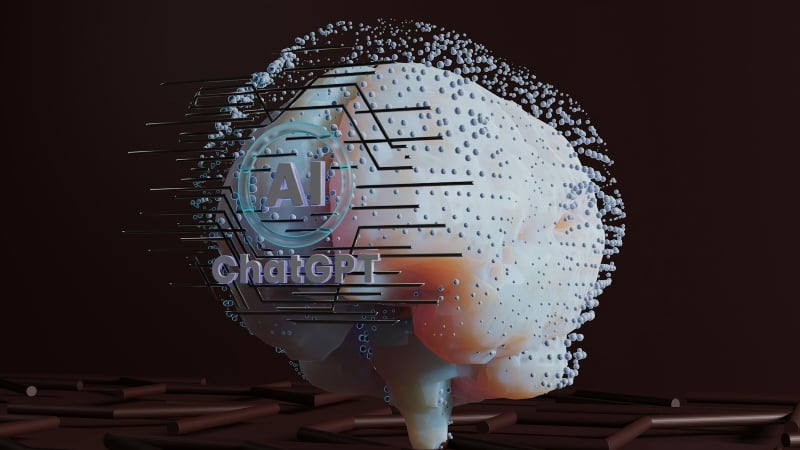
By JARED WADLEY-U. MICHIGAN
The tests involved ChatGPT answering psychological survey questions and playing interactive games. The researchers compared ChatGPTs’ choices to those of 108,000 people from more than 50 countries.
Study lead author Qiaozhu Mei, professor at University of Michigan’s School of Information and College of Engineering, says AI’s behavior—since it exhibited more cooperation and altruism—may be well suited for roles that require negotiation, dispute resolution, customer service, and caregiving:
Q: How should people respond to this information, especially as the future will tell the extent to which AI enhances humans rather than substituting for them?
A: We now have a formal way to test AI’s personality traits and behavioral tendencies. This is a scientific way to observe how they make choices and to probe their preferences beyond what they say. ChatGPT presents human-like traits in many aspects such as cooperation, trust, reciprocity, altruism, spite, fairness, strategic thinking, and risk aversion. In certain aspects, they act as if they are more altruistic and cooperative than humans. To this end, our results are more optimistic than concerning.
Q: What differences did you and your colleagues expect to see between chatbots and people?
A: Modern AI models are big black boxes. When we compare the chatbots with humans, we can often only compare their outputs. There have been many tests, such as whether AI can hold conversations like humans, write poems like humans, or solve math problems like humans, and similarities are found. But these similarities are all based on what they “say,” which is not surprising as these AI models are all designed to predict what’s likely to be said next.
Before our study, there wasn’t a way to go beyond what they say and understand how they make decisions, which is crucial before we can trust these AIs in high-stake tasks, such as health care or business negotiations. There has been lots of skepticism about how AI would behave in these scenarios.
Q: What future research can be built upon this? Where do we go from here?
A: Our research benefits from the joint force of computer science and behavioral economics. We bring classic games in behavioral economics into the classic test for AI: the Turing test. We also compare the AI’s responses in these tests to the responses of a diverse population of human players.
One obvious short-term future research is to add more behavioral tests, test more AI models, and compare their personalities and traits. A critical future direction is to educate the AIs so that their behaviors and preferences can represent the diversity of the human distribution (rather than an “average human”).
In the long term, we hope the study opens a new field “AI behavioral science,” where researchers from different disciplines can work together to investigate AI’s behaviors, their relations to humans (such as how to facilitate their collaboration rather than competition), and their impact on the future society.
Q: What areas would this similarity be useful to people?
A: It helps people understand when and how we can rely on AIs to help us make decisions. In general, the results should increase people’s trust in AI in certain tasks. For example, knowing that ChatGPT is more altruistic and cooperative than average humans could increase our trust in using it for necessitating negotiation, dispute resolution, or caregiving. On the other hand, knowing that its personalities and preferences are much narrower than the human distribution helps us understand their limitations in tasks where the diversity of human preferences is crucial to consider, such as product design, policymaking, or education.
The study’s coauthors are from the University of Michigan, MobLab, and Stanford University.
Source: University of Michigan
Original Study DOI: 10.1073/pnas.2313925121
—
Previously Published on futurity.org with Creative Commons License
***
You Might Also Like These From The Good Men Project
 Compliments Men Want to Hear More Often
Compliments Men Want to Hear More Often  Relationships Aren’t Easy, But They’re Worth It
Relationships Aren’t Easy, But They’re Worth It  The One Thing Men Want More Than Sex
The One Thing Men Want More Than Sex  ..A Man’s Kiss Tells You Everything
..A Man’s Kiss Tells You Everything Join The Good Men Project as a Premium Member today.
All Premium Members get to view The Good Men Project with NO ADS. A $50 annual membership gives you an all access pass. You can be a part of every call, group, class and community. A $25 annual membership gives you access to one class, one Social Interest group and our online communities. A $12 annual membership gives you access to our Friday calls with the publisher, our online community.
Register New Account
Log in if you wish to renew an existing subscription.
Username
First Name
Last Name
Password
Password Again
Choose your subscription level
- Yearly - $50.00 - 1 Year
- Monthly - $6.99 - 1 Month
Credit / Debit Card PayPal Choose Your Payment Method
Auto Renew
Subscribe to The Good Men Project Daily Newsletter By completing this registration form, you are also agreeing to our Terms of Service which can be found here.Need more info? A complete list of benefits is here.
—
Photo credit: unsplash
The post ChatGPT Shows More Altruism and Cooperation Than People appeared first on The Good Men Project.
Original Article









